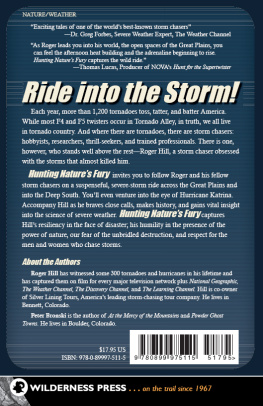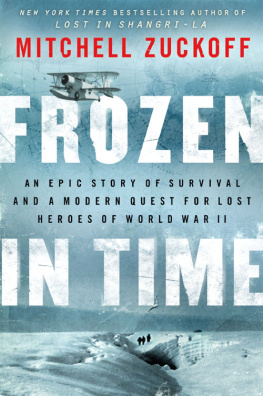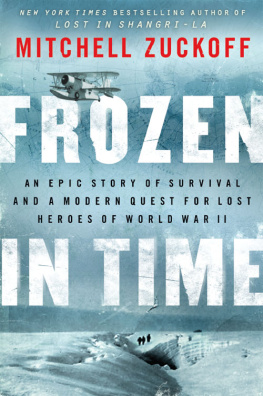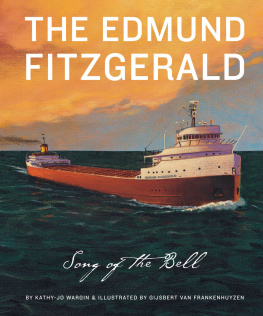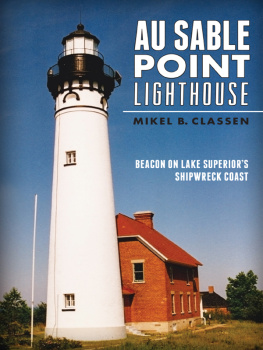So Terrible a Storm

A Tale of Fury
on Lake Superior
By Curt Brown

First published in 2008 by Voyageur Press, an imprint of MBI Publishing Company, 400 First Avenue North, Suite 300, Minneapolis, MN 55401 USA.
Copyright 2008, 2011 by Curt Brown
All rights reserved. With the exception of quoting brief passages for the purposes of review, no part of this publication may be reproduced without prior written permission from the Publisher. The information in this book is true and complete to the best of our knowledge. All recommendations are made without any guarantee on the part of the author or Publisher, who also disclaim any liability incurred in connection with the use of this data or specific details. We recognize, further, that some words, model names, and designations mentioned herein are the property of the trademark holder. We use them for identification purposes only. This is not an official publication.
Voyageur Press titles are also available at discounts in bulk quantity for industrial or sales-promotional use. For details write to Special Sales Manager at MBI Publishing Company, 400 First Avenue North, Suite 300, Minneapolis, MN 55401 USA.
To find out more about our books, join us online at www.voyageurpress.com .
Digital edition: 978-1-61060-255-6
Softcover edition: 978-0-76034-012-7
Library of Congress Cataloging-in-Publication Data
Brown, Curt, 1960
So terrible a storm: a tale of fury on Lake Superior / by Curt Brown.
p. cm.
Includes bibliographical references.
ISBN 978-0-7603-3243-6 (hb w/jkt)
1. ShipwrecksSuperior, Lake. 2. Mataafa (Steamship) I. Title.
G525.B8573 2008
917.7490441dc22
2008000832
Edited by Danielle Ibister
Designed by Elly Gosso
Maps by Patti Isaacs, Parrot Graphics
Endpapers: Map of ships wrecked in the Lake Superior storm of
November 2729, 1905.
: An ore boat on Lake Superiors horizon, seen from Two Harbors.
Minnesota Historical Society
: Duluth piers in a 1906 storm. Photo by Charles P. Gibson, Minnesota Historical Society
Printed in the United States of America
To my lighthouses
Adele, Alison, Mackenzie, Zac, and Judy
They are swept by Borean and dismasting blasts as direful as any that lash the salted wave; they know what shipwrecks are, for out of sight of land, however inland, they have drowned full many a midnight ship with all its shrieking crew.
~ Herman Melville
Moby-Dick, 1851
Never in the history of Duluth has there been an incident so fraught with human interest, so compelling and absorbing.
~ Mary D. McFadden
Duluth News Tribune
December 10, 1905
It has been a week that will always be remembered. It has been a week that children of today will tell their childrens children about years hence. It has been a hard, harsh, heart-wringing period, and nothing can replace the manly lives that have been sacrificed on the altar of commerce to appease the wrath of the lake.
~ Duluth Evening Herald
December 2, 1905



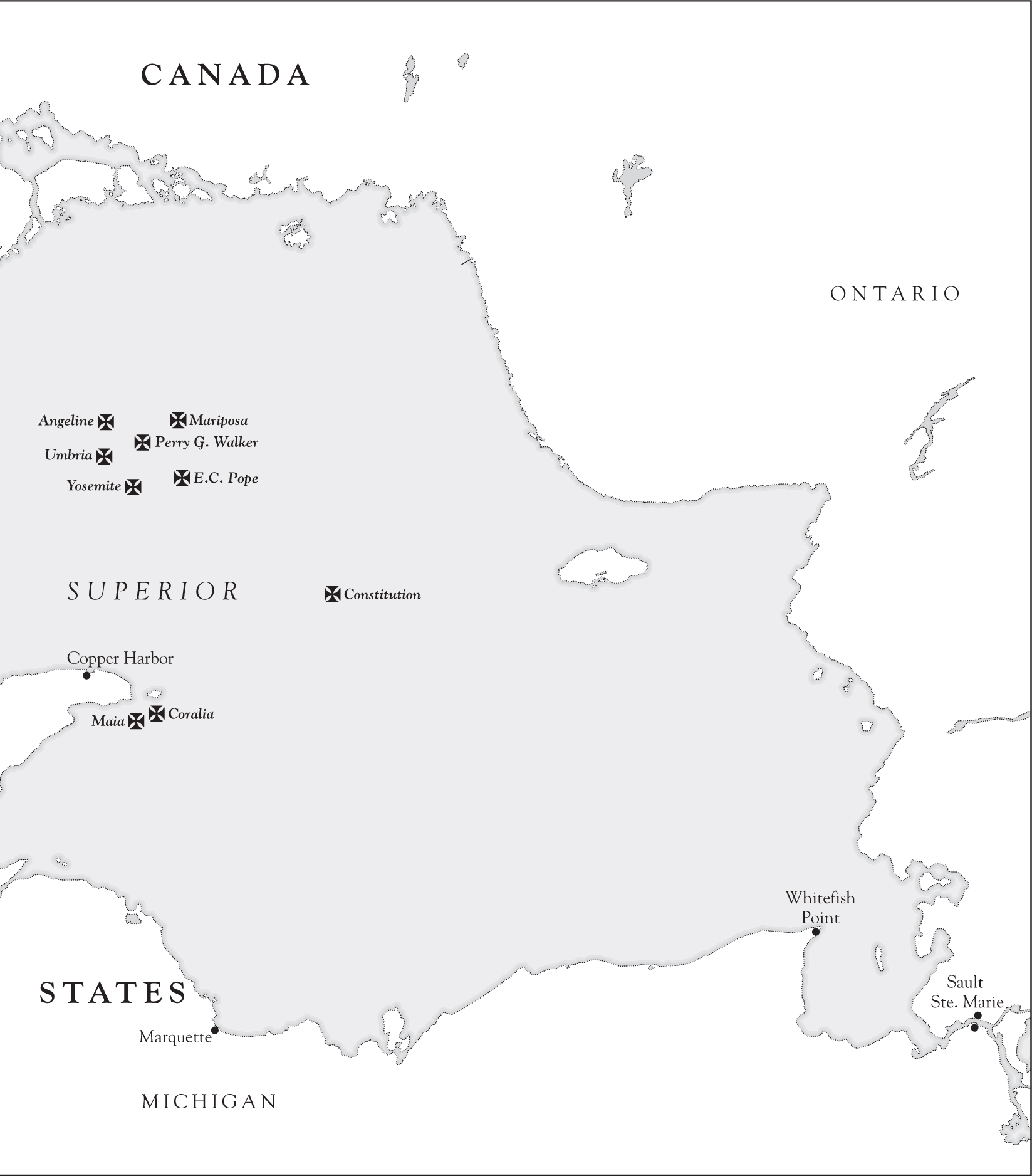

It is the most dangerous piece of water in the whole world. Here winter falls in autumn, and from then until late spring it is a region of blizzards and blinding snowstorms. The coasts are harborless wildernesses with... reefs and rocky headlands that jut out like knives to cut ships in two.
~ James Oliver Curwood
Early 1905
For me, this story started at the end. On a family trip up Lake Superiors North Shore, about fifty miles up Highway 61 from Duluth, Minnesota, we did what so many do. We pulled over to visit the Split Rock Lighthouse perched 178 feet up a rock cliff above the slate waters of Lake Superior. It could have been a tour guide in a straw boater hat mimicking the garb of a 1910 lighthouse keeper. Or simply a brochure. I dont recall.
I just know my curiosity was piqued when I learned this brick beacon on a lonely cliff was built in response to a nasty 1905 storm that battered nearly thirty boats and claimed more than thirty lives of sailors trapped on Lake Superior during three wind-howling, frigid days in late November.
Unlike most sailing journeys, which embark from a ports dock, this tale set sail during a trip to the cool marble inside the downtown library of St. Paul, Minnesota. A thick, dusty volume, with a light odor of mildew, carried an even thicker title: The Great Lakes, the Vessels that Plough Them: Their Owners, Their Sailors, and Their Cargoes, Together with a Brief History of Our Inland Seas.
Published in 1909, James Oliver Curwoods tome quickly and pointedly challenged me to write this book. The writers century-old voice actually dared me.
For some unaccountable reason, Curwood bemoans in his preface, the Great Lakes... have been almost entirely neglected by writers.
One of the most inexplainable mysteries of the century, he goes on, exists in the fact that the Great Lakes of to-day are as little known to the vast majority of Americans as they were a quarter-century ago.
I grew up on Lake Michigans North Shore in the Chicago suburb of Glencoe. But sitting in that library, this fat book open before me on a walnut table, I struggled to place the Inland Seas on my mental map. Never mind my college degrees in history and American studies. This long-dead writer was right. I didnt know Lake Huron from Lake Ontario. When I learned in my ensuing research that a bulk freighter named the German actually crashed on the Glencoe beach during the 1905 storm, I felt almost guilty about my ignorance. And Curwoods shaming picked up speed.
Americas great Inland Seas have remained unwatched and unknown except by a comparative few, he scolded. Not one person in ten knows what the Great Lakes stand for to-day. While a thousand writers have sung of the greatness and romance of the watery wastes that encircle continents, none have told of those vast unsalted seas....
Even of those who live in the states bordering the Great Lakes but few know that these fresh water highways possess... the elements of romance and tragedy.
He lightens up some, acknowledging that the boom of shipping on the Lakes grew fast around the turn of the twentieth century: In a small way the general lack of knowledge is excusable, for the development has been so rapid and so stupendous that people have not yet grasped its significance.
Curwood spent twenty years sailing the Lakes and writing the history of their captains, their commerce, and their storms. He issued his challenge to me on page 92:
I believe that the failure to treat of the human interest of the Lakes is one of the most inexcusable omissions in American literature. In the rush for modern progress the Lakes have been forgotten.... Historians, novelists and short-story writers have neglected the Lakes.








